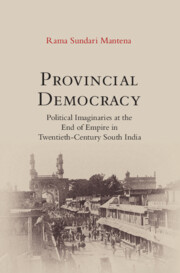Book contents
- Frontmatter
- Contents
- List of Figures
- Acknowledgements
- List of Abbreviations
- Map
- Introduction: Self-Determination, Federation, and Civil Liberties in Twentieth-Century South India
- 1 Liberalism and Anti-Colonialism in South India
- Part I Federation
- Part II Civil Liberties
- Conclusion: After Empire—Language and Regionalism
- Bibliography
- Index
2 - Self-Determination, Federation, and the Provinces
Published online by Cambridge University Press: 30 April 2023
- Frontmatter
- Contents
- List of Figures
- Acknowledgements
- List of Abbreviations
- Map
- Introduction: Self-Determination, Federation, and Civil Liberties in Twentieth-Century South India
- 1 Liberalism and Anti-Colonialism in South India
- Part I Federation
- Part II Civil Liberties
- Conclusion: After Empire—Language and Regionalism
- Bibliography
- Index
Summary
After the reversal of the 1905 partitioning of Bengal that inspired the first broadbased mass agitation against colonial rule, the Swadeshi movement, the colonial government of India began to put forward proposals for the devolution of power, gradually moving British India towards self-government. This became a catalyst for different political groups to imagine political futures in which the Indian states would be self-governed. One prominent structure being floated around at the time was a federation, or a federated union of states. By the late 1920s and the 1930s, an all-India federation was proposed as a working idea and especially took force after the Round Table Conferences that were to foster dialogue between the British government and the Indian nationalists (and their various political affiliations) along with the native states (the princes). Even before these political developments, Chittaranjan Das, a prominent member of the INC and the founder of the Swaraj Party, in his 1922 book, Freedom through Disobedience, wrote of the necessity—indeed, the inevitability—of a great Asiatic federation. This was at the height of Pan-Asianism and Pan-Islamism and speaks to the prevalence of federation as an ideal alongside the nation state emerging at the end of European empires. The federation idea spoke to the reality that multiple states would emerge at the end of empire, which would have to rely on mutual cooperation. Furthermore, the idea resonated with an emergent internationalism based on transnational affiliations. Taking his cue from the prominence of Pan-Islamism at the time, Das forecasted an ‘Asiatic Federation’ as the wave of the future after the fall of the European empires:
Even more important than this is the participation of India in the great Asiatic Federation which I see in the course of formation. I have hardly any doubt that the Pan-Islamic movement which was started on a somewhat narrow basis has given way or is about to give way to the great Federation of all Asiatic people. It is the union of the oppressed nationalities of Asia. Is India to remain outside the union? I admit that our freedom must be won by ourselves, but such a bond of friendship and love of sympathy and co-operation between India and the rest of Asia, nay between India and all the liberty-loving people of the world is destined to bring about World Peace.
- Type
- Chapter
- Information
- Provincial DemocracyPolitical Imaginaries at the End of Empire in Twentieth-Century South India, pp. 67 - 103Publisher: Cambridge University PressPrint publication year: 2023

